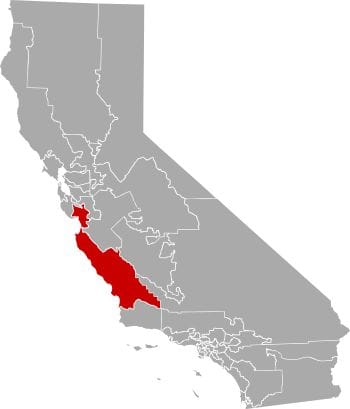"No Party Preference" Voters To Sway Senate District 15


If you've been following the Independent Voter Network recently, you've probably noticed our focus on races to watch in California. As we've mentioned before, since the passage of Proposition 14 in 2010, the rules have changed. The June 5th primary election will now be open, meaning that Republican, Democratic, Third-Party, and "No Party Preference" voters will all receive the same ballot. Independent voters will no longer be excluded from participating in the primary process, causing an influx of candidates to run independent campaigns. What's more, California experienced redistricting in 2011, creating newly apportioned districts where incumbents are longer guaranteed an edge.
Located on the central coast of California, Senate District 15 includes all or parts of five counties in California: Monterey, San Luis Obispo, Santa Barbara, Santa Clara, and Santa Cruz. After the 2011 redistricting, the district now encompasses Campbell, Cupertino, Saratoga, Los Gatos, and San Jose, accounting for 52.1% of Santa Clara County. With 45.6% of voters registered as Democrats, this district clearly leans Democratic, with 67.4% of voters casting a ballot for Barack Obama over John McCain in the 2008 presidential election.
Because the district has such a high propensity of Democratic voters, both candidates running for Senate are Democrats. Former Assembly Member Joe Coto faces sitting Assembly Member Jim Beall, who currently represents the 24th Assembly District.
So what's the significance of a Senate race with Democrat pitted against Democrat, in a district that leans Democrat?
Almost 28% of voters in Senate District 15 have opted out of the two-party system and are registered as "No Party Preference," placing this district on our radar of races to watch.
What's interesting about this election is that the open primary opens the door for a multitude of situations to occur. No longer will the November ballot be Republican vs. Democrat. The open primary enables voters to pick candidates based on policy, beliefs, experience, and merit. Meaning that the top-two vote getters in June could belong to the same party, or in some cases, no party at all.
In this case, we see a highly competitive race between two Democrats, and the lack of third candidate guarantees a Democrat vs. Democrat race in the general election. Because independents can now participate in the primary election, both candidates will have to reach out to this demographic in order to win the election. Independent voters can and will sway the election in California Senate District 15.


